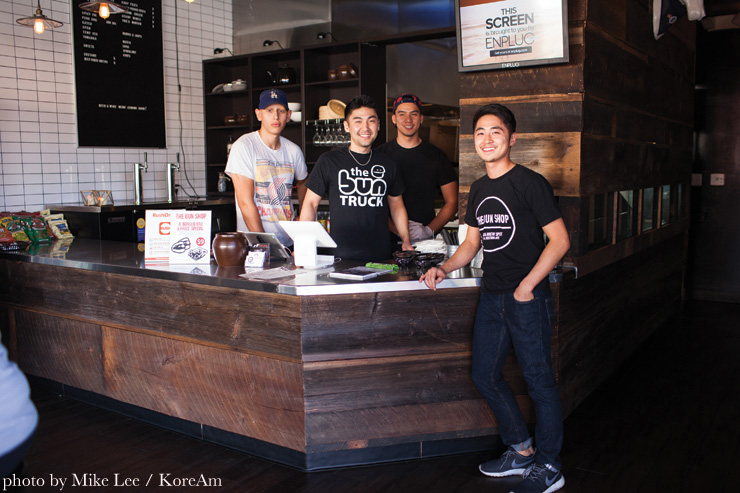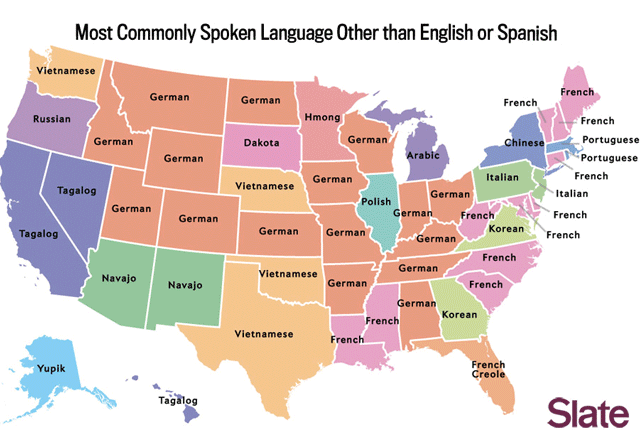The Bun Shop founders Brian Yeun (far right) and James Seok (middle), with two of their employees, Carlos Gonzalez (left) and Mike Alido.
Busting Out the Big Buns
Two hardworking friends from Detroit, Brian Yeun and James Seok, took a chance three years ago and started The Bun Truck, reincarnated now in The Bun Shop in L.A.
by JAMES S. KIM
Photos by MIKE LEE
Among the 3,200 food trucks that make their way around Los Angeles County, few make it to the point where the owners can open a brick and mortar. Brian Yeun and James Seok, co-founders of The Bun Truck, are among those lucky few. After three years of riding up and down the neighborhoods of L.A., serving up their tasty bao bun tacos to the masses, these friends and business partners have now transferred the heart and soul of The Bun Truck to The Bun Shop.
The restaurant, like its rolling predecessor, features the first West Coast version of the steamed bao bun taco that Korean American chef David Chang made famous at his Momofuku restaurants in New York. “Four years ago, the seed was planted, with hopes that we would start a restaurant,” said Yeun, 28. “We just grinded it out for the last three years in the truck, and we were fortunate enough to start this just a few months ago.”
The Bun Shop opened its doors this past January along the bustling, business- littered Western Avenue in Koreatown, where the storefront—with its cute bun face logo (picture a lower-case “e” with eyes in it)—stands out among the forest of Korean-language signs. People walking the street outside, including Koreans, often stare in through the large windows, curious about the sleek, modern restaurant blasting hip-hop music.
Koreatown does have a reputation for high business turnover, but The Bun Shop is quickly establishing itself as a go-to place in L.A., drawing people from all crowds.
“It’s supposed to be a homey spot, a place you can come with friends to grab food, and, hopefully soon, grab a drink here,” said Yeun, referring to a pending liquor license. “I want a space where anybody feels welcome.”
It’s the kind of spot that Yeun, who formerly worked for accounting and finance firms, dreamt about on a cold winter night four years ago. While on a corporate business trip in New York, he had an epiphany of sorts and called his old high school friend, Seok, a recent culinary school graduate who was working late evenings at the swanky Morimoto restaurant in the Meatpacking District. Ready to give up the corporate rat race, Yeun asked if Seok would be interested in being the chef for a food truck he wanted to start in L.A., where Yeun was living. It was the first step toward opening a restaurant, an idea that first took shape in high school.
“I always felt like hospitality was my thing,” Yeun said. “It was catering to people, making people welcome. Sociology was my favorite class in college, just understanding why groups of people are the way they are, why they like what they like. To me, it screamed restaurant.”
Yeun eventually convinced Seok to move west and take the leap of faith with him. After scoping out the city’s food truck scene, they didn’t see any that served steamed bao bun tacos, so they decided to go for it. With Yeun handling the business side of operations, and Seok in charge of the kitchen as executive chef, the two high school friends from Detroit entered the competitive, grind-it-out world of food trucks.
“I will forever be grateful to my boy Brian for reaching out to me that winter,” said Seok, 26. “I’m extremely proud of us both for moving out from a small town to a big city—especially a foodie city [like] L.A.—and having some success in this damn competitive industry.”
Even now, with the brick and mortar, the pair still divvies up their duties similarly, with Yeun working the front of the house and handling marketing, while Seok works the kitchen, making adjustments to the food and menu, which features seven different bao bun tacos: Beefy, Spicy Pig, Pork BBQ, Katsu, Spam, Temp Veg and the Tomanko. The Temp Veg and Tomanko are vegetarian-friendly and also feature a bit of Mediterranean flavor that is influenced by the large Greek population in Detroit. The Tomanko, for example, includes a panko-fried tomato patty, cucumber, citrus slaw and ranch, pro- viding a crunchy texture that pairs well with the soft bao shell. If you’re having a hard time visualizing that, Seok says you’ re not alone.
“Because the buns are so soft, we try to make it so you don’t get bites of mush,” Seok explained. “I try not to categorize them with tacos or sliders, but then, what are they? We’ve had so many customers walk in and not even know what the buns are. Even after looking at pictures, they are confused. I say, ‘Just try one for yourself!’”
The meat in the Beefy, Spicy Pig and Pork BBQ buns are prepared traditional Korean barbecue-style, with a few of Seok’s tweaks. Customers can order the buns a la carte, or mix and match two or three with a side, including their signature, rosemary-seasoned Shop Fries that garnered much praise during the truck years.
Other sides include their Ba’corn Cheese, their bacon-laced take on the Korean anju, as well as sweet and spicy Sticky Wings, sweet potato fries and fried wontons. To round off the meal, customers can choose between an order of Custard Buns, which comes on a bed of popcorn drizzled with salted caramel, or Deep Fried Oreos with green tea ice cream.
Yeun contracted architect James Denton, a Detroit native now based out of San Diego, to have a go at the interior design. The furniture and old-fashioned incandescent light bulbs are a trendy and relevant throwback to Detroit’ s golden era. To add some Southern California into the mix, the wood in the booths and wall paneling is reclaimed from the Santa Monica Pier.
Customers may notice a few other Detroit details when they walk into the restaurant. A moose head bears a bandana with the Detroit Tigers’ logo, and Yeun may be wearing his “Bad Boys” Detroit Pistons T-shirt, which will definitely catch the eyes of longtime Lakers fans.
“Although Brian and I were not born in Detroit, being raised there for most of our lives definitely left an imprint on us, and it shows in our personalities and in the shop,” said Seok. “Our home will be forever in Michigan, so we do our best to represent our city as best we can.”
“People know about the bad things of Detroit, but there are so many good things,” Yeun added. “For us, we take away the hard work and blue collar work ethic. If you see us here, James working in the back, we’ve been grinding it out for three years, and we still continue to work [hard]. Especially in L.A., I think there’s this culture of you wanting to be a celebrity chef. We don’t have that at all. You’ll see us sweating back there all the time. If anything, we’re proud of that.”
And that work ethic means no rest for these guys anytime soon. As busy as they are now, they say they hope one day to open additional locations of The Bun Shop. Yeun also has plans to open a Jimmy John’s, a Midwest sandwich chain, in L.A. County with his older brother Steven (of The Walking Dead fame), who also is an investor in the shop.
In addition, though they are firmly planted in Los Angeles now, Seok and Yeun say they share a long-term vision of returning to their hometown of Detroit one day to start a successful restaurant there. It’s a deeply personal goal for these friends, who each saw his own immigrant parents’ businesses rise and struggle with the city.
“The plan for us is to always go back to Detroit,” said Yeun. “But you don’t learn anything if you’re stuck in one place and that’s all you know. For us, it’s let’s go out here, and if we can make it in L.A., and we can make a successful business out here, why can’t we do it in Michigan? I think what we are most proud about is that, when we take a step back, we say, hey, we are two kids from Detroit who had no business starting anything in L.A. And [now] we have a restaurant.”
This article was published in the May 2014 issue of KoreAm. Subscribe today! To purchase a single issue copy of the April issue, click the “Buy Now” button below. (U.S. customers only. Expect delivery in 5-7 business days).











